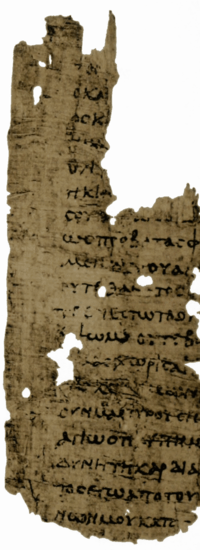Romans 14
| Romans 14 | |
|---|---|
|
Epistle to the Romans 8:12-22 in the bigger of two fragments forming Papyrus 27 (recto side), written in the 3rd century. | |
| Book | Epistle to the Romans |
| Bible part | New Testament |
| Order in the Bible part | 6 |
| Category | Pauline epistles |
Romans 14 is the fourteenth chapter of the Epistle to the Romans in the New Testament of the Christian Bible. It is authored by Paul the Apostle, but written by an amanuensis, Tertius of Iconium, while Paul was in Corinth, in winter of AD 57-58.[1] Paul wrote to the Roman Christians in order to give them a substantial resume of his theology.[2] Protestant Reformer Martin Luther summarised this chapter as Paul's teaching that "one should carefully guide those with weak conscience and spare them; one shouldn't use Christian freedom to harm, but rather to help, the weak".[3] Lutheran theologian Johann Albrecht Bengel says that Paul "refers all things to faith".[4]
Text
- The original text is written in Koine Greek.
- Some most ancient manuscripts containing this chapter are:
- Codex Vaticanus (AD 325-350)
- Codex Sinaiticus (AD 330-360)
- Codex Alexandrinus (ca. AD 400-440)
- Codex Ephraemi Rescriptus (ca. AD 450; complete)
- This chapter is divided into 23 verses.
Structure
The New King James Version organises this chapter as follows:
- Romans 14:1-13 = The Law of Liberty
- Romans 14:14-23 = The Law of Love
The New International Version sub-titles the whole chapter "The Weak and the Strong".
The Contemporary English Version organises the chapter as follows:
- Romans 14:1-12 = Don’t Criticize Others
- Romans 14:13-23 = Don’t Cause Problems for Others
Cross references
The weak in faith
The word which Paul uses for "weakness" in faith (Greek: τον ... ἀσθενοῦντα τῇ πίστει, ton asthenounta tē pistei) refers to both physical illness and moral weakness.[5] In 2 Timothy 4:20, Paul says that his missionary companion Trophimus was sick (Greek: ἀσθενοῦντα, asthenounta) when [he] left him at Miletus.
Verse 4
- Who are you to judge another’s servant? To his own master he stands or falls. Indeed, he will be made to stand, for God is able to make him stand.[6]
Verse 13
- Therefore let us not judge one another anymore, but rather resolve this, not to put a stumbling block or a cause to fall in our brother’s way.[7]
Verse 23
- But he who doubts is condemned if he eats, because he does not eat from faith; for whatever is not from faith is sin.[8]
See also
- Unclean animals
- Other related Bible parts: Isaiah 45, Isaiah 49, Matthew 7
References
- ↑ Halley, Henry H. Halley's Bible Handbook: an Abbreviated Bible Commentary. 23rd edition. Zondervan Publishing House. 1962.
- ↑ Holman Illustrated Bible Handbook. Holman Bible Publishers, Nashville, Tennessee. 2012.
- ↑ Luther, M., Preface to the Letter of St. Paul to the Romans, translated by Andrew Thornton, OSB
- ↑ Bengel's Gnomon of the New Testament on Romans 14, accessed 2 October 2016
- ↑ Strong's Concordance 770: astheneó
- ↑ Romans 14:4
- ↑ Romans 14:13
- ↑ Romans 14:23
